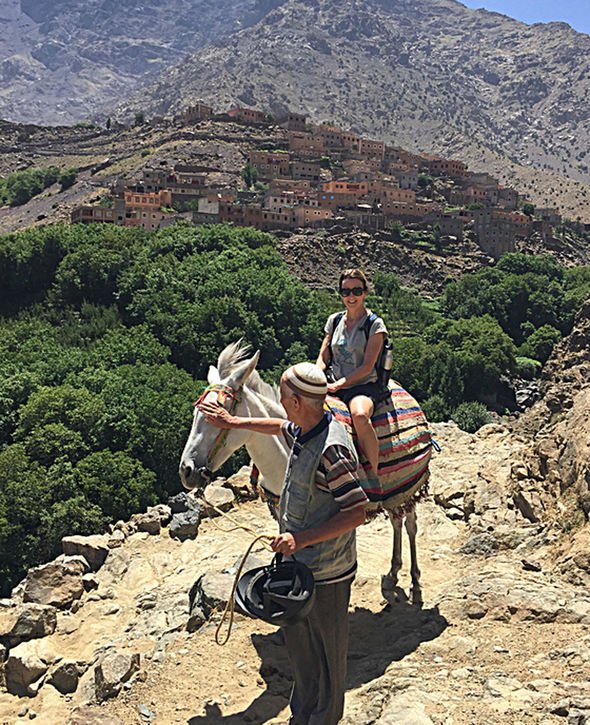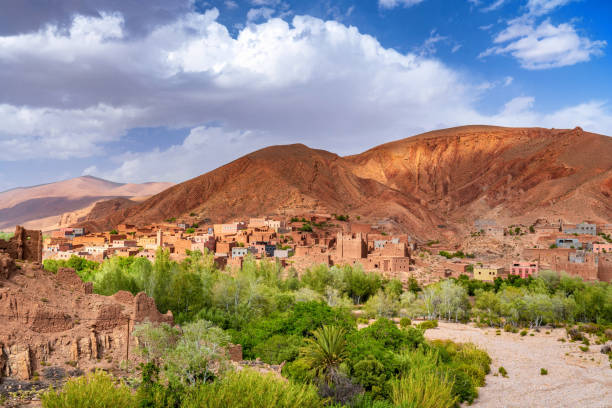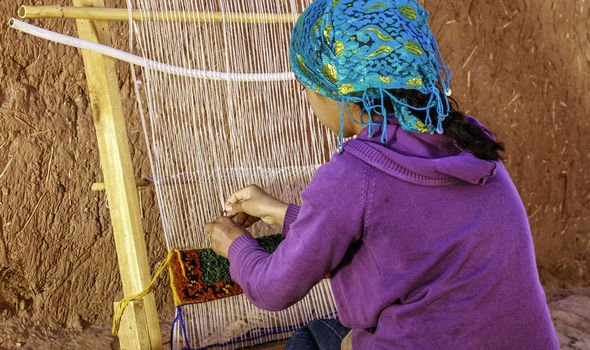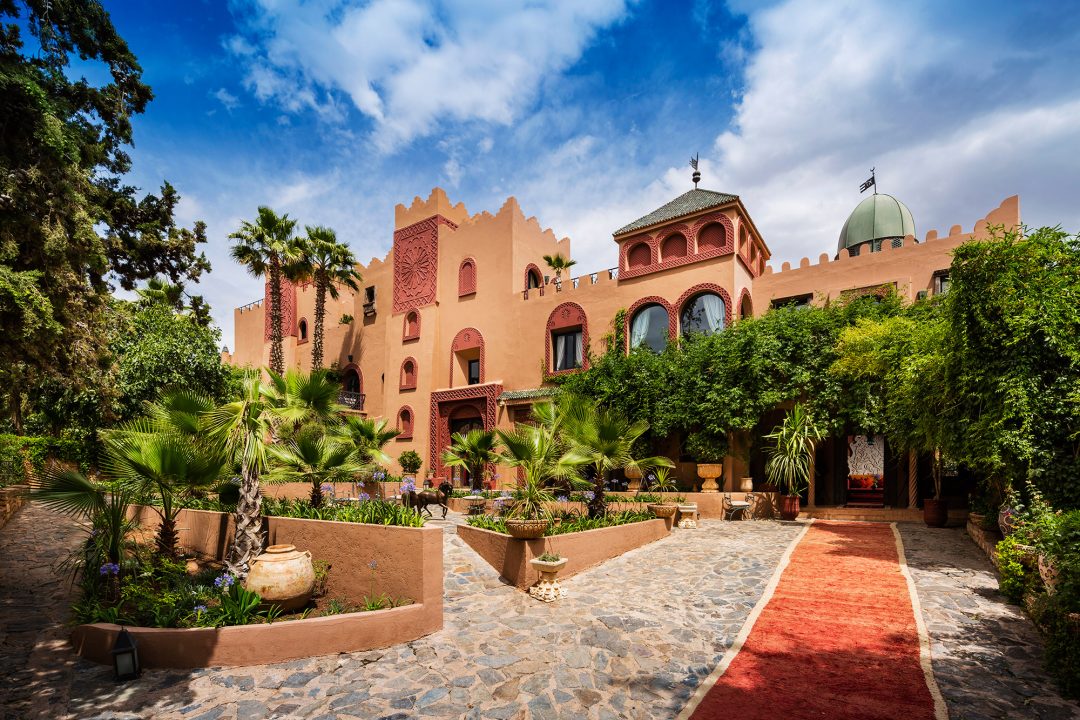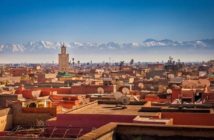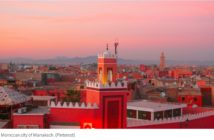Express.co.uk
By Jane Memmler
Life is simple and raw up here in Morocco’s High Atlas Mountains.
The early morning sun casts a languid haze, bouncing off the rich terracotta-hued mountains. Delicate plumes of smoke swirl out of chimneys gently heating the brick hammams in readiness for the Berbers’ weekly deep cleanse.
Gulls, reminiscent of a scene from Hitchcock thriller The Birds, swoop over the flat roofs before soaring back into the deep blue heavens. The whinnying and hee-hawing of the mountain’s most trusty steeds, the mule, echo off the valley’s barren walls, as does the hypnotic muezzin slowly reaching his haunting crescendo as he calls the faithful to prayer. Life is simple and raw up here in Morocco’s High Atlas Mountains. Clusters of rudimentary, dusty villages cling to steep jagged hillsides, watched over by towering minarets. Accessing them is challenging. The only way in, and out, is via narrow rocky paths. It’s a place no delivery van could traverse, let alone building machinery. The Berbers have long resided in this harsh environment. It’s not just the climate, their way of life is devoid of the modern trappings we take for granted in the west. There’s no entertainment, no cinemas, no cafes, no shops. You may stumble across a restaurant in a family-run hotel but most are content just tending their animals and farmland.
In summer it’s glorious and busy with seasonal hikers.
Come winter, the temperature plummets and the mountains are dusted with snow.
Imlil province encompasses seven small villages, with Armad being the largest (pop. 1,300).
At 1,740 metres above sea level, the air is much clearer and infinitely cooler than bustling Marrakech, an hour’s drive away.
I’m exploring some of them with Rachid, a guide from nearby Ashane.
We meet in Imlil, the area’s “capital” where streets are lined with shops selling honey, terracotta tagine pots, and baskets adorned with large pom-poms.
On the town’s bridge, wiry old men tout for mule trek business while their charges, swathed in colourful rugs, stand by patiently.
It’s also the starting point for the hardier tourists making the pilgrimage up Africa’s second-highest mountain, Toubkal, as the proliferation of hiking gear shops attest.
This landscape is biblical, with jagged peaks of red clay whose sides are shrouded in walnut and apple trees offering temporary respite from the heat.
Rachid knows this terrain – and its people – like the back of his hand.
Confident steps over rocks and and down ravines show his impeccable guiding pedigree, a result of two years travelling over the entire country studying with the guiding school.
Occasionally we met a porter whose mules were laden with luggage and cooking equipment on their way to setting up camp for hikers who pace their hike to the summit.
In tiny villages children played football on the flat rooftops while women in brightly coloured skirts and headscarves swept what dust they could, attempting to clear the ever-present dirt from their doorsteps.
We stopped at Rachid’s home for mint tea and biscuits.
Passing through a courtyard, home to ducks and rabbits, his charming children and beautiful wife welcomed me like an old friend.
The clean, simple house was unadorned except for the elaborate flock-patterned cushions and rugs.
I spent a happy and humbling half-hour gleaning a rare insight into the life of a Berber.
By 2000 metres the views – and quiet – were overwhelming.
It was almost unfathomable to think that the pulsating, chaotic city of Marrakech was merely an hour away.
I’d not only come to Morocco to try to understand more about the lives of the Berbers, I wanted to experience Sir Richard Branson’s Moroccan retreat Kasbah Tamadot.
In 1998 when he was in the country at the start of his challenge to circumnavigate the globe in a hot air balloon, his mother Eve spotted the property during a foray into the hills – and she persuaded Richard to buy the Kasbah.
He agreed on the proviso that she would help the local Berber communities.
And so the Eve Branson Foundation was formed.
There’s something special about this incredible, remote property at the foothills of the Atlas mountains.
Start with the name. Tamadot means soft breeze. Behind its imposing walls lies an extraordinary oasis.
Graduated towers, rooftop terraces, hidden courtyards and gardens of roses and mini orchards in which peacocks roam.
There are only 28 rooms, including six palatial suites and superb African tents with vast bathrooms and their own jacuzzi in a private garden.
All are stunning, with traditional Berber touches such as linens and bathmats made by the local women.
Meals are served alfresco, either on the roof or overlooking the glorious pool and graduated lawns, watching a rose pink sunset.
One doesn’t have to leave the property to find entertainment.
Try breadmaking lessons given by two charming Berber ladies; hands-on tagine courses held in the miniscule kitchen, and plenty of sports from tennis and table tennis to chilling by the pool.
But that would mean missing out on getting under the skin of this intriguing community.
At nearby Tansghart Craft Centre set up by the Eve Branson Foundation, local women learn traditional crafts such as embroidery.
It’s a humbling experience spending time with these happy ladies who take great pride in their work.
Next door, the Tamgounsi weaving centre produces stunning rugs on traditional looms.
Eve is clearly a much-loved figure in this part of Morocco and her photo proudly hangs in the workshops.
You can understand why. The foundation has organised rubbish collections along the main road and set up a Motherhouse (maternity hospital) in Asni – a quiet, clean refuge for women from villages high in the mountains to come and give birth in a secure environment.
It’s here at the weekly Asni market that the rural community convene and catch up on local gossip.
For visitors (I was the only Westerner) it’s an assault on the senses and offers an avenue into Morocco’s soul.
Wafts of mint and sizzling kebabs fill the air.
Shopkeepers lead mules through the melange of stalls.
Farmers tout their just-ripened fruits and veg from rickety tables, while baskets bursting with fluorescent spices, sticky dates and sweet biscuits, sit among barbers wielding long blades giving wet shaves.
I’ve found the real Morocco, far removed from the Western world.
THE KNOWLEDGE
Virgin Limited Edition (0208 600 0430/virginlimitededition.com) offers doubles at Kasbah Tamadot from £505, (two sharing). B&B. Three for two night offer (until September 30, 2019) for £1,010pp. easyjet offer return flights from Gatwick to Marrakech from £68.48. easyjet.com Hilton Gatwick offers doubles from £99 per night, B&B. hiltonhonors.com, 0330 021 4487 Tourist info: visitmorocco.com Eve Branson foundation: evebransonfoundation.org.uk






